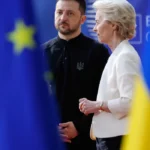The Israeli army is bombing Rafah this Friday, a town in southern Gaza where more than a million Palestinians displaced by the war are crowded together, amid fears of a humanitarian “disaster” from its American ally, which its American ally considers “excessive” its response against Hamas.
A sign of high tensions in the Middle East in the wake of the war in Gaza, salvos of rockets were launched overnight from Lebanon towards northern Israel, shortly after an Israeli airstrike against a military leader of Lebanese Hezbollah , and the United States has carried out bombings against Houthi rebels in Yemen.
The head of American diplomacy Antony Blinken, who concluded a regional tour on Thursday aimed at encouraging efforts to obtain a truce, urged Israel to “protect” civilians in its operations in Gaza, including Rafah.
After ground operations in Gaza City, then in Khan Younes, Prime Minister Benjamin Netanyahu ordered preparations for an offensive on Rafah, a town located on the closed border with Egypt, where 1.3 million Palestinians are crowded together. the vast majority of whom are people displaced by the clashes of recent months.
Washington warned Thursday of a “disaster” in Rafah and assured that it would not support an operation “without serious and credible planning” concerning civilians there. “I think, as you know, the response in Gaza, in the Gaza Strip, has been excessive,” US President Joe Biden said, in a rare criticism of Israel.
UN Secretary-General Antonio Guterres said he was “alarmed” by a ground operation there. “Such action would exponentially worsen the current humanitarian nightmare whose regional consequences are already incalculable,” he wrote on the social network X.
Roses and bombs
During the night from Thursday to Friday, witnesses reported deadly strikes in central and southern Gaza. And the Palestinian Red Crescent expressed regret over the death of three children in an Israeli strike on Rafah.
On site, air raids and local fears of ground operations have not completely discouraged Husam Abdul Hadi, a 20-year-old Palestinian, who sells roses there to lighten hearts.
“Our goal is to bring a smile to everyone’s faces, change their mood, make them happy and make them laugh,” he says. “I found him selling roses, so I wanted to buy four roses, because I have four children. I want to give them to my wife, and I hope that we will get past the war and live in peace,” says one of his customers Abou Elias Mehanna.
“Gaza is no longer Gaza,” testified Palestinian Authority Culture Minister Atef Abou Seif, who was in Gaza to launch Palestinian Heritage Day when the war between Israel and Hamas broke out. He was stuck there for 90 days.
The war was sparked on October 7 when Hamas commandos infiltrated from the Gaza Strip, where the movement seized power in 2007, carried out an attack in southern Israel that resulted in the deaths of more than 1,160 people, mostly civilians, according to an AFP count based on official Israeli data.
Around 250 people were also kidnapped and taken to Gaza. According to Israel, 132 hostages are still held there, of whom 29 are believed to have died.
In retaliation, Israel, which considers Hamas a terrorist organization, like the United States and the European Union, vowed to “destroy” this group and launched an offensive which left at least 27,840 dead in the territory. Palestinians, the vast majority of them women, children and adolescents, according to the latest report from the Hamas Ministry of Health.
Cairo and Riyadh
In Cairo, a “new round of negotiations”, sponsored by Egypt and Qatar with the participation of Hamas, began Thursday to obtain “calm in the Gaza Strip” as well as an exchange of Palestinian prisoners and hostages, according to an Egyptian official.
An agreement at the end of November allowed a one-week pause in the fighting, the delivery of more aid to Gaza, the release of around a hundred hostages and some 240 Palestinian prisoners imprisoned in Israel. This time, the talks are about a truce lasting several weeks.
“We expect very (…) difficult negotiations, but Hamas is open to discussions and eager to achieve a ceasefire,” explained an official close to Hamas.
Saudi Arabia received on Thursday heads of diplomacy from Qatar, Egypt, Jordan, the Emirates, as well as Hussein al-Sheikh, tenor of the Palestinian Authority (PA) of Mahmoud Abbas, political rival of the Hamas, for “consultations” on the situation in Gaza.
The head of Iranian diplomacy, Hossein Amir-Abdollahian, whose country leads an “axis of resistance” against Israel, including Hamas, Hezbollah and the Houthis, is expected in Lebanon on Friday.
This article is originally published on lequotidien.lu






